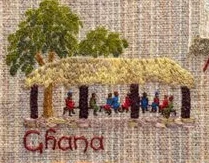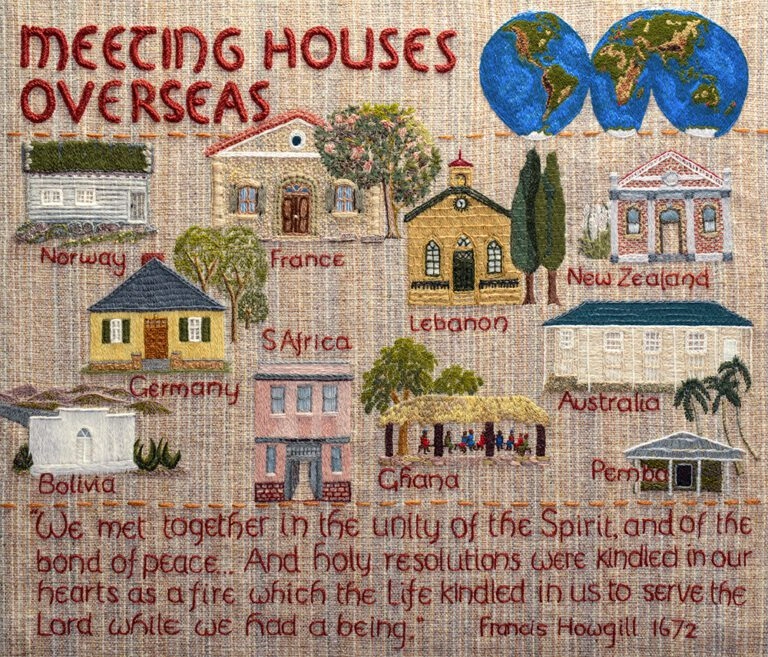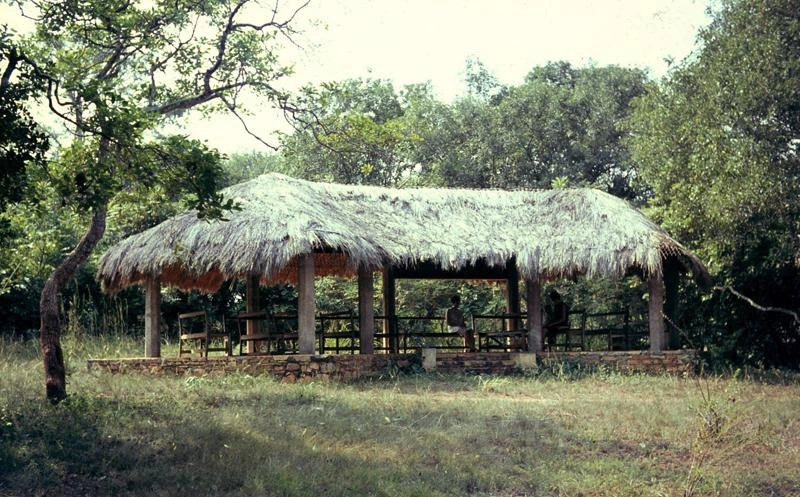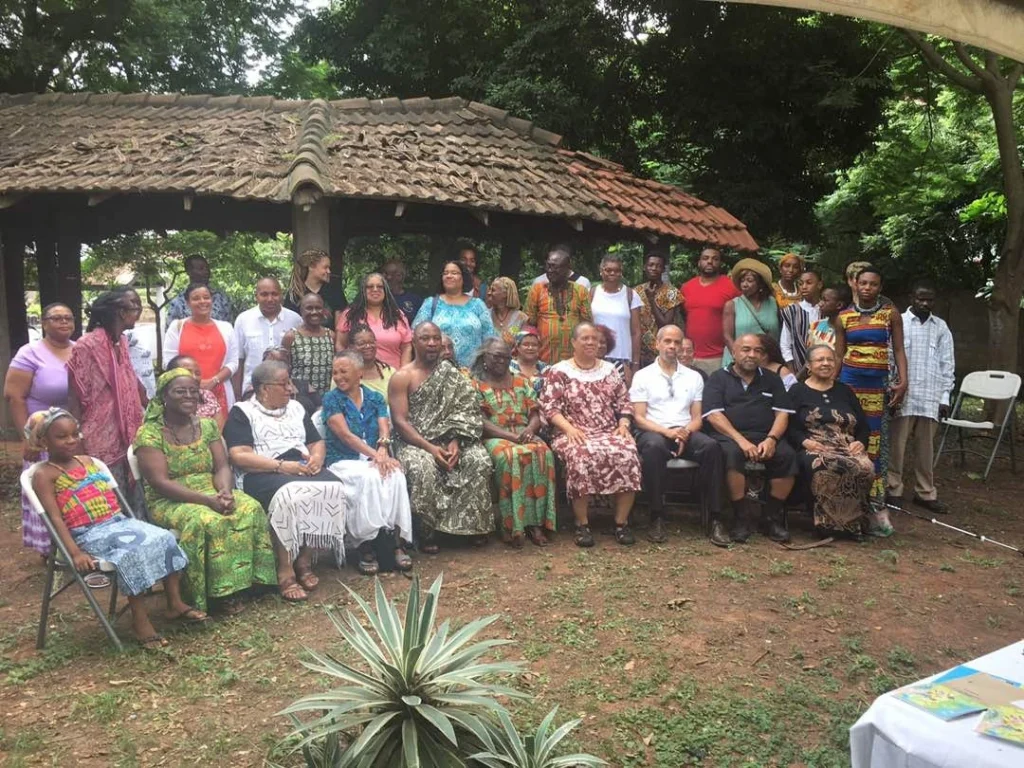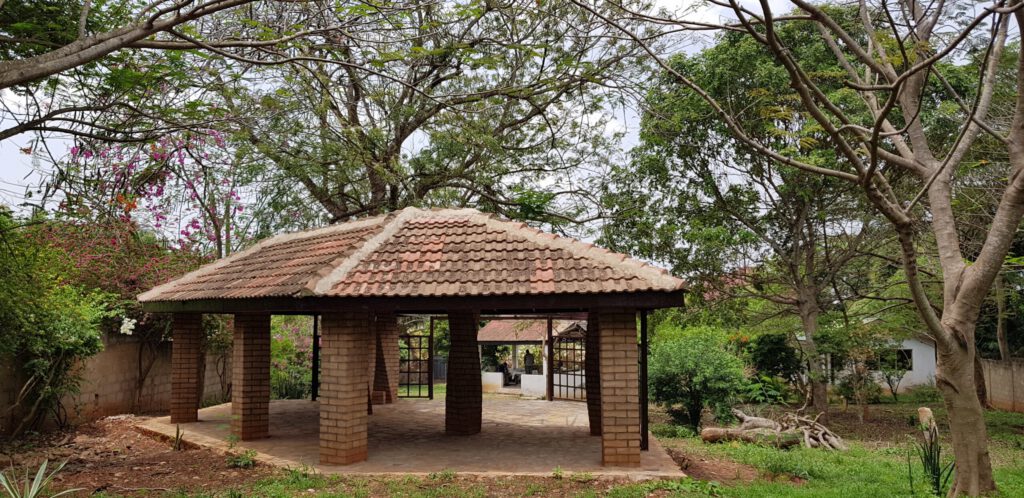Our History
Quakers in Ghana: 100 Years of Faith and Service
Quakers In Ghana
Quakerism was introduced to Ghana indirectly through education by expatriate teachers in the 19th century¹. However, the establishment of a formal Quaker meeting in Ghana, specifically Hill House, occurred in 1925¹. It seems that Quaker influence was present in Ghana before the official establishment of Hill House.
This influence can be traced back to the 1840s, when British Quakers were involved in educational and missionary work in the Gold Coast, now Ghana². The 1847 date mentioned earlier likely refers to the presence of Quaker individuals or influence in Ghana, rather than the establishment of a formal Quaker meeting².
-
Establishment of Schools and Education: Quakers from Britain, particularly from the London Yearly Meeting, sent missionaries to Ghana to establish schools.
- They worked closely with the colonial government and local communities to establish schools, including Achimota School and College.
- The teachers and educators introduced innovative teaching methods and emphasized the importance of character development.
-
Healthcare and Nutrition: Quakers established healthcare projects, such as clinics and nutrition programs, particularly in rural areas.
- They worked with local healthcare professionals and communities to provide training, resources, and support.
- Quakers also advocated for improved healthcare policies and infrastructure in Ghana.
-
Community Development: Quakers provided funding and technical support for community development projects, such as the Putubiw Development Programme.
- They worked with local communities to identify needs and develop projects that promoted self-sufficiency and empowerment.
- Quakers also provided training and capacity-building programs for community leaders and members.
-
Social Justice and Human Rights: Quakers in Ghana spoke out against human rights abuses and social injustices, particularly during the 1970s.
- They worked with other civil society organizations to promote democratic values, transparency, and accountability.
- Quakers also provided support and solidarity to marginalized communities and individuals.
-
Interfaith Dialogue and Cooperation: Quakers in Ghana actively engaged in interfaith dialogue and cooperation, either by themselves or through the Christian Council of Ghana for which they have been members, recognizing the importance of building bridges between different faith communities.
- They worked with other faith-based organizations to promote peace, understanding, and social cohesion.
- Quakers also participated in national and international interfaith initiatives.
-
Environmental Conservation: Quakers in Ghana emphasized the importance of environmental conservation and sustainability.
- They promoted environmentally friendly practices, such as reforestation and sustainable agriculture.
- Quakers also advocated for policies and practices that protected Ghana’s natural resources and promoted eco-friendly development.
Throughout their involvement in these areas, Quakers in Ghana demonstrated their commitment to promoting peace, justice, and human dignity.
These individuals, along with many others, have contributed significantly to the Quaker legacy in Ghana. Hill House in Ghana is associated with the establishment of a Quaker presence in the country, dating back to 1925.
Unfortunately, our current sources of information are incomplete. Possible sources where there may be more information on Hill House members’ accomplishments may be found in:
- Quaker archives: The Quaker Archives at the Friends House Library in London or the Quaker Archives at Haverford College in Pennsylvania may have records or documents related to Hill House and the Quakers involved with it.
- British Yearly Meeting: The Ghana Yearly Meeting of the Society of Friends may have records or information about Hill House and the Quakers who have been involved, which may be in the British Yearly Meeting archives, as Ghana came under the oversight of the British Yearly Meeting until 2003.
Hill House
The Hill House Meeting originates from a group of British Quakers recruited as staff for Achimota College and School from 1925, who established a meeting for themselves and other staff members. In 1934, they built the Hill House Meeting Garden Shelter (name given to it at the time) on the school property.
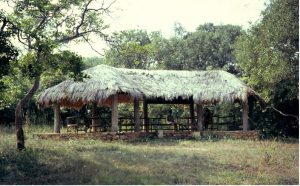
The look of the original structure. Hill House 1
Due to career changes and postings, the Meeting remained small between 1925 and the early 1940s, with a predominantly expatriate membership and a few Ghanaians. Meetings lapsed in the mid-40s before a flurry of activity from 1947 – 1948, led by Mrs. Ion Acquah. By 1953, there was a real revival, led by David Acquah, and sustained by the staff of the University of Ghana. From then on, the meeting has continued. Meetings for worship were initially advertised in the national papers, and this attracted a few Ghanaians and expatriates, increasing the number of attendees, although membership has always remained relatively small.
At the turn of the century, the roof of Hill House meeting place was refurbished, in which concrete roofing tiles replaced the original thatched roof. This we named Hill House 2.
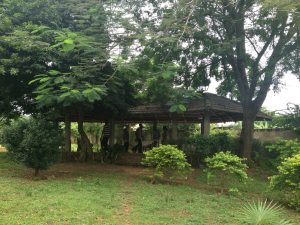
View of Hill House 2 in the background
In early 2009, an unauthorised incursion on Hill House took place. The damage caused by their incursion made the place unsafe for worship, and it required rebuilding.
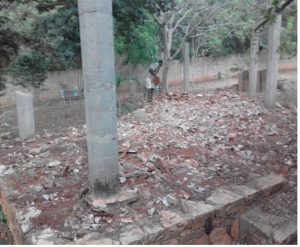
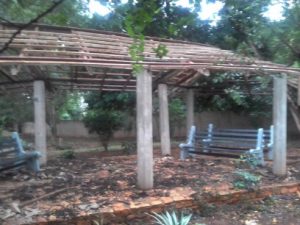
Damaged round pillars of Hill Houses 1 and 2 were replaced in the current structure of Hill House 3.
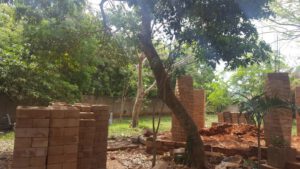
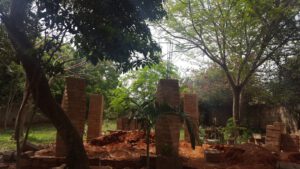
This process took several years to rebuild through fundraising efforts. Until its completion, Hill House Quakers met in the structure previously erected for children to worship, built earlier with a donation from an earlier Member.
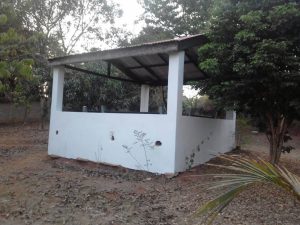
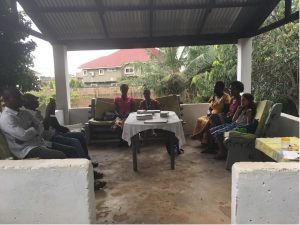
This was while the current place of worship was being designed and built.
Eventually, in 2019, we completed our current structure, Hill House 3.
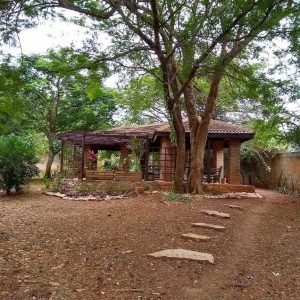
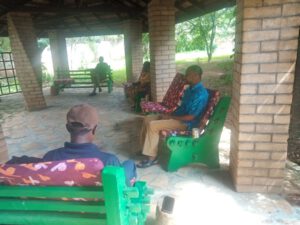
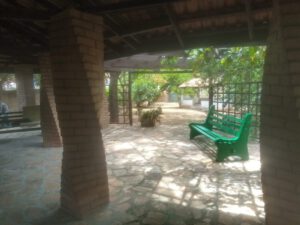
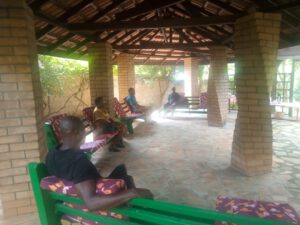
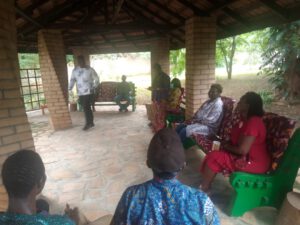
Views of the current meeting place for worship.
You will note that in the original Hill House meeting space, the pillars were round concrete pillars. These are what got damaged and, for health and safety reasons, needed to be replaced. With the rebuilding, it was decided to replace these pillars with stronger, unique pillars, which added to the feeling of space and silence in the worship grounds. The restructuring was ably guided by architect Kuukuwa Manful of the NGO Sociarchi and Johnson Kennedy (both members of our meeting). The new pavilion makes use of earth bricks as an eco-friendly alternative to concrete, reusing some of the roof tiles and paving stones from Hill House 2. The new pavilion emphasizes equality by creating a disability access entrance for all members to enter. Its strong foundation means that the pavilion will serve as a light on the hill for generations to come. We are currently developing our grounds further to host Quaker events and compost production.
Historical activities
Our written records of Hill House Meetings from its establishment to its clerkship under David Acquah in the late 50s to 80s are sketchy.
By the 1970s, there were four meetings in Ghana – Accra, Cape Coast, Tema, and Kumasi.
At the time, Hill House had three meetings for very young children, adolescents, and adults simultaneously.
Easter Gatherings started in 1974 and continued to 2010. Moreover, individual members of the Meeting and the Meeting as a collective whole played active roles in social causes in Ghana and in the Christian Council, making the existence of the Quakers well-known.
The Easter Gathering. By 1954, Friends had identified their need for a gathering of all Friends resident in Ghana, as well as those who are working in neighbouring countries and might wish to share a fellowship. With their Ghanaian counterparts, the first Easter Gathering of Friends came off that year and become an annual event till 2010.
Christian Council Membership. In the mid-1960s, Friends in Ghana became anxious to relate even more closely to the Christian Community in Ghana. Accordingly, it sought and was admitted into the Membership of the Christian Council of Ghana as a constituent member.
Social Work – In line with the tradition of Friends, Quakers in Ghana, right from their very early beginnings, they have sought to render social service as a testimony of their concept of Work and worship are inseparable.
The Red Cross
Frank Jocelyn rendered pioneering services in the creation of Junior Red Cross Links in Educational Institutions in the early 1930s, from his base at Achimota School and College.
Liberal Studies
With the support of the Prisons Authority in the Gold Coast, Ioné Acquah promoted liberal studies, lectures, and Library services in Accra and later in Sekondi.
Voluntary Work Camp Association (VOLU)
Supported by Friends in Accra, Cape Coast etc and with the considerable patronage of Francis L. Bartels (then Headmaster of the Mfantsipim School), Gordon C., and John Hall started the Voluntary Work Camp Association of Ghana (VOLU), which was formally inaugurated in 1956.
Funding for Community Development
- Corn mill for the Putubiw Development Programme, Putubiw, near Cape Coast.
- Funds for Lume Community travel to Kenya in a brick and tile making project (Lume is 10 miles from Ho in the Volta Region).
- A social survey to establish some community needs in Nima was undertaken by a South African Sociologist – Ngysani, under the supervision of Professor St Claire Drake, An American Visiting professor was then in the Gold Coast.
Nutritional and Health Project
The Accra schools’ nutritional and health project under the supervision of Adam Curle, Professor of Education at the University of Ghana and the Department of Social Welfare and Community Development and the Ministries of Health and Education. Covered selected schools in Jamestown.
Hill House, London Yearly Meeting, Wesley Girls’ High School, Ministry of Health were involved in the Ankanful Mental Hospital Project to support the occupational therapy unit in Cape Coast.
Educational Support
- Posting of Quaker volunteers to various teaching posts in Ghana – Wesley Girls’ High School (Cape Coast), Aburi Girls’ Secondary School (Aburi), Navrongo Secondary School (Navrongo), Mfantsiman Girls Secondary School in Saltpond, and Ghana International School(Accra).
- Aburi Girls’ School Domestic Science project at Gyankama directed by Sarah Hall(nee Ainsworth) and financed by Hill House.
By Hill House Meeting. June 2025
Archives
- Friends House Library, London – This library has an extensive collection of Quaker records, including those related to Ghana.

